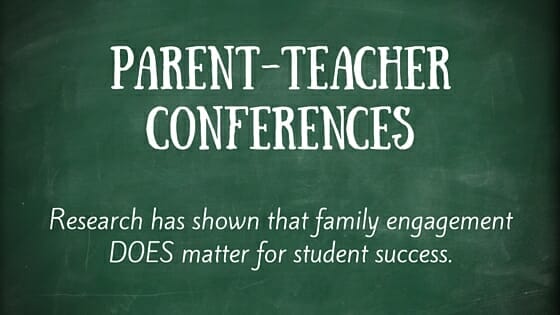
As you prepare for your next Parent-Teacher Conference, remember that the meeting is a two-way conversation. It’s a great opportunity for the teacher to learn more about your  child, and for you both to “get on the same page” with the common goal of helping your child to success. Research has shown that family engagement DOES matter for student success, so don’t be afraid to be a driving force in your child’s education!
child, and for you both to “get on the same page” with the common goal of helping your child to success. Research has shown that family engagement DOES matter for student success, so don’t be afraid to be a driving force in your child’s education!
To start with, it may help to reflect a bit about each person’s role in promoting success in the school-home communication loop.
- The School should communicate the importance of the conferences to the entire school and work with teachers to develop best practices in conducting the most effective parent-teacher conferences. The School should also make data about each child’s progress available to parents (as both Issaquah and Lake Washington do with their parent access portals).
- Teachers should be familiar with your child’s work and be prepared to go over specific assignments or assessments during the conference. The teacher should have a list of key issue to cover and questions for the parents to help him/her better understand their student. The teacher should also listen actively, soliciting family input into student learning needs and styles, and asking what goals the parents may have for their child.
- Parents should be prepared to lend insight into their child’s learning needs as well as behavior. It does help teachers if they know about any issues happening at home that may affect the student’s performance at school, so you as the parent can decide how much you are willing to share. Parents should be prepared to listen without defensiveness, and to ask the kinds of questions that will advance their child in the learning process.
Some specific tips we recommend before heading to the school for the Parent-Teacher Conference:
- Review your child’s work, grades, and progress reports. Take a close look at the breakdown of the grades. Are there low homework scores (indicating your child didn’t understand, or turned in something incomplete) or zeros (they didn’t turn in anything at all or perhaps the grades weren’t recorded properly?). Also, what’s the overall grade for assessments (tests/quizzes) versus grades for homework. Students who have 100% on homework but struggle on tests typically over-estimate their ability to produce the knowledge without notes or other support.
- Talk with your child about his/her progress. “So what do you think your teacher will say?” is a great way to start that conversation. How long does it usually take you to do homework in that class? How are you filling out your planner? Are due dates clear?
- Talk with the other adult mentors in your child’s life (coaches, other teacher-types, tutors, etc…) about your child’s strengths and challenges. How are my child’s listening skills? What is he/she most interested in? Has he/she shared any worries with you lately?
- Make a list of questions to ask during the conference. Some of you will only have 5-10 minutes with the teacher. Make it count! What kind of learner is my child? How long should homework take? Is work graded on completion or accuracy? Is my child working to his/her ability? How can I help support you and what’s happening in class? Any behavioral or social issues I should know about?
- Think about ways you/your family can support your child’s learning at home. Do you have a dedicated study area set up? Is it organized and appealing? Are you interested in arranging for tutoring (either private tutoring like we do at Pacific Learning Academy, peer tutoring, or after-school programs provided by the school, etc.)? What kind of help does your child actually want? Do they get more done staying at the school and finishing homework in the library, or do they get more done at home?
We welcome your suggestions and advice for talking to teachers, and also invite you to call us in the office if you’d like some advice specific to your situation. Just ask for Kirsten!
Pacific Learning Academy is a one-on-one school offering single courses and dual enrollment, as well as full-time high school. We also offer tutoring in all subjects from 6th to 12th grade, including SAT/ACT diagnostic testing and prep, either in homes or local libraries across the Eastside (Issaquah, Sammamish, etc…). See more at www.PacificLearningAcademy.com.
